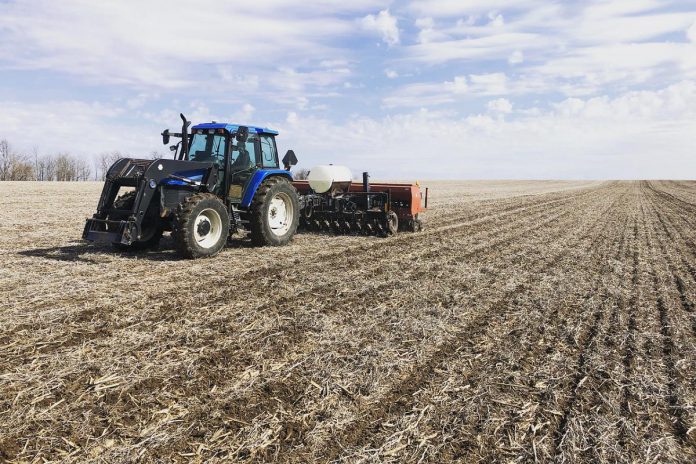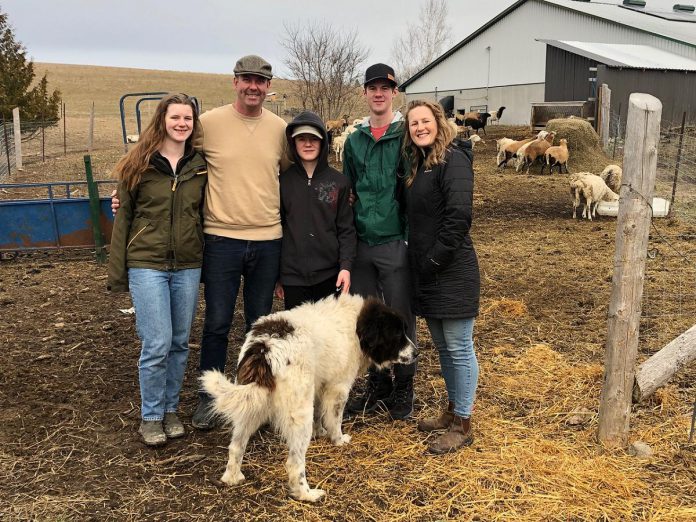
Woodleigh Farms is not just growing crops for today, but growing a sustainable future through innovative farming practices – including one that sequesters carbon while improving soil quality and reducing the need for fertilizer for generations to come.
Located in the Township of Cavan Monaghan, one of Peterborough County’s eight townships, Woodleigh Farms is a sixth-generation family farm first settled in 1902. Now under the direction of Norm Lamothe and his family, Woodleigh Farms grows soy, wheat, oat, and corn, produces maple syrup, sells firewood and hay, raises livestock, and operates a market garden and year-round passive solar greenhouse.
Making regenerative and sustainable practices a priority, such as no-till farming, rotational grazing, and composting, everything on the farm is centred around managing and improving the soil. For Lamothe, soil quality is critical for sustainable agriculture, as traditional farming practices have depleted soil organic matter – with some estimates suggesting a reduction of 50 per cent over the last century in North America.
“If we want to feed a bigger world with less acreage, then we have to really pay attention to how we manage the soil – it’s the building block of life,” says Lamothe. “Introducing more carbon to the soil is going to help us do that.”
That’s why Lamothe is embarking on the “biggest project” in his entrepreneurial career, and one that he labels his “legacy.”
Woodleigh Farms’ Catching Carbon pilot project, the first of its kind in Canada, is producing and trialling biochar, a carbon-sequestering organic amendment that supports crop and soil health. Biochar is a stable form of carbon produced through pyrolysis — the heating of an organic material, such as biomass, in the absence of oxygen.
The Catching Carbon project will see unmarketable and unusable forest biomass turned into wood chips and fed into a new purpose-built pyrolysis plant that will produce a pure carbon by-product. Biochar, which is a form of charcoal, can then be used as a soil amendment that can sequester up to four tonnes of carbon dioxide (CO2) per tonne of biochar. In addition to sequestering carbon, biochar can reduce the need for fertilizer and improve crop yields.

Its innovative project has already earned Woodleigh Farms the Green Economy Award from Green Economy Canada, along with a financial award from the Rotary Club of Peterborough’s Rotary Environmental Innovators Fund (REIF).
Being involved in such innovation would not be possible without the support from local organizations and businesses, including Peterborough GreenUP. Woodleigh Farms is a member of the environmental organization’s Green Economy Peterborough and is working towards the target of becoming a net-zero operation.
As a provincial leader in soil health initiatives, Woodleigh Farms supports research and trial projects led by the Ontario Soil Network, Ontario and Crop Improvement Association, Ecological Farmers Association of Ontario, and numerous universities, including the University of Waterloo, Trent University, and the University of Guelph.
Throughout the summer, Woodleigh Farms also hosts field days, inviting local farmers to share their experiences while demonstrating some of their innovative and regenerative practices.
Supporting its agricultural innovation, Woodleigh Farms sources products from local businesses including machinery from Cavan’s All Tracker Parts, fertilizer from Cavan Agri, various products from Sunderland Co-operative, and fuel from Upper Canada Fuels.
The farm also works with Graze & Gather to distribute maple syrup and other products, and has developed unique and customizable syrup bottles for local businesses like Millbrook’s Pastry Peddler, Peterborough’s Monaghan Lumber, and Peterborough’s Moving Media.
Woodleigh Farms is open by appointment only at 528 Sharpe Line in Cavan. For more information, visit cavanfresh.ca.
The Local Advantage in Peterborough County is a branded editorial feature series about locally owned independent businesses in Peterborough County, created in partnership with Peterborough County’s Economic Development & Tourism Division.
As part of its response to the impact of U.S. tariffs, Peterborough County is showcasing the many unique businesses located in the county, both by sharing their stories of success and how they support both residents and other businesses in their communities.
Whether by shopping at local businesses, dining at local restaurants, staying at local accommodation, or enjoying local experiences, residents and visitors can enhance the economic resilience of Peterborough County during these challenging times and help establish a sustainable foundation for the future.
For more information about economic development and tourism in Peterborough County, visit www.ptbocounty.ca/ecdev and The Kawarthas Tourism at thekawarthas.ca.




























